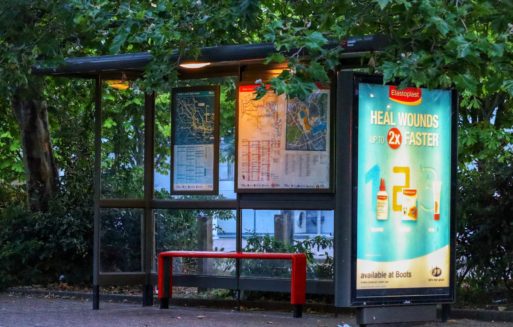
A bus stop to nowhere gives people with dementia an opportunity to find calm.
How can memory care facilities calm people with dementia and reorient them to their surroundings while keeping them from wandering off? They set up a fake bus stop.
Staff at the Benrath Senior Center nursing home in Duesseldorf, Germany discovered the success of this approach after building a fake bus stop for their residents. Individuals suffering with memory loss often yearn for the familiarity of home, and may insist on leaving. But, once they’ve sat down to wait for a bus, staff can easily coax them back inside.
Richard Neureither, Benrath’s director, explained how it works to Alz Live, “We will approach them and say that the bus is coming later and invite them in for a coffee. Five minutes later they have completely forgotten they wanted to leave.” Benrath’s staff told RadioLab that previously, several patients had escaped their premises. One woman had boarded an actual bus and ended up in a town 20 miles away. Others were located at grocery stores, wandering in the forest, or even at their prior homes.
Elsewhere, some facilities have taken a similar approach. St. George’s Hospital in London installed a bus stop in a ward on its fifth floor to help dementia patients “connect with old memories,” and create “a calm place to sit down and take a break.”

Many associate bus stops with the opportunity to leave, as well as with a sense of independence and freedom.
Bridges by EPOCH in Hingham, Massachusetts, meanwhile, built a bus stop to nowhere on its grounds. “When you look out the window from the dining room to the courtyard, and you see a bus stop, it’s empowering,” Alicia Seaver, the facility’s Director of Memory Care, said in a short promotional film. “Because it tells a memory care person: You can leave whenever you want.”
In addition to those with dementia, patients approaching death will often speak of their coming transition as a journey – whether by train, bus, or some other form of transit. In numerous subconscious ways, it seems, fake bus stops can offer a sense of recognition, comfort and support.

 Facilities Create Fake Bus Stops for Patients with Dementia
Facilities Create Fake Bus Stops for Patients with Dementia


 How Dare You Die Now!
How Dare You Die Now!

 “Help Me, Helen”
“Help Me, Helen”














